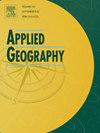Does urban renewal program increase urban vitality? Causal evidence from Beijing City, China
IF 5.4
2区 地球科学
Q1 GEOGRAPHY
引用次数: 0
Abstract
After decades of rapid urban expansion, urban renewal programs have emerged as a vital urban policy across cities worldwide and their effect have obtained increasing attention. However, existing research has largely overlooked the effect of urban renewal programs on urban vitality and have not adequately accounted for potential selection bias. To address these gaps, we use propensity score matching (PSM) method to overcome the selection bias and estimate the causal effect of urban renewal programs on urban vitality across 712 blocks in Beijing City, China. Our findings indicate that these programs significantly increase urban vitality, with urban renewal blocks experiencing an average gain of 18.23 %. Furthermore, the PSM effectively addresses the risks of an exaggerated effect of urban renewal program on urban vitality (inflating the positive effect to 670.68 %), thereby mitigating bias in the program evaluations. These results underscore the importance of accounting for selection bias in programs evaluations and highlight the need to consider non-material dimensions of urban renewal.
城市更新计划能增加城市活力吗?来自中国北京市的因果证据
经过几十年的城市快速扩张,城市更新计划已成为全球城市的一项重要城市政策,其影响越来越受到关注。然而,现有的研究在很大程度上忽视了城市更新计划对城市活力的影响,并且没有充分考虑潜在的选择偏差。为了解决这些差距,我们使用倾向得分匹配(PSM)方法克服了选择偏差,并估计了北京712个街区的城市更新计划对城市活力的因果效应。我们的研究结果表明,这些项目显著提高了城市活力,城市更新街区的平均收益为18.23%。此外,PSM有效地解决了城市更新计划对城市活力的夸大影响的风险(将积极影响夸大至670.68%),从而减轻了计划评估中的偏见。这些结果强调了在项目评估中考虑选择偏差的重要性,并强调了考虑城市更新的非物质维度的必要性。
本文章由计算机程序翻译,如有差异,请以英文原文为准。
求助全文
约1分钟内获得全文
求助全文
来源期刊

Applied Geography
GEOGRAPHY-
CiteScore
8.00
自引率
2.00%
发文量
134
期刊介绍:
Applied Geography is a journal devoted to the publication of research which utilizes geographic approaches (human, physical, nature-society and GIScience) to resolve human problems that have a spatial dimension. These problems may be related to the assessment, management and allocation of the world physical and/or human resources. The underlying rationale of the journal is that only through a clear understanding of the relevant societal, physical, and coupled natural-humans systems can we resolve such problems. Papers are invited on any theme involving the application of geographical theory and methodology in the resolution of human problems.
 求助内容:
求助内容: 应助结果提醒方式:
应助结果提醒方式:


